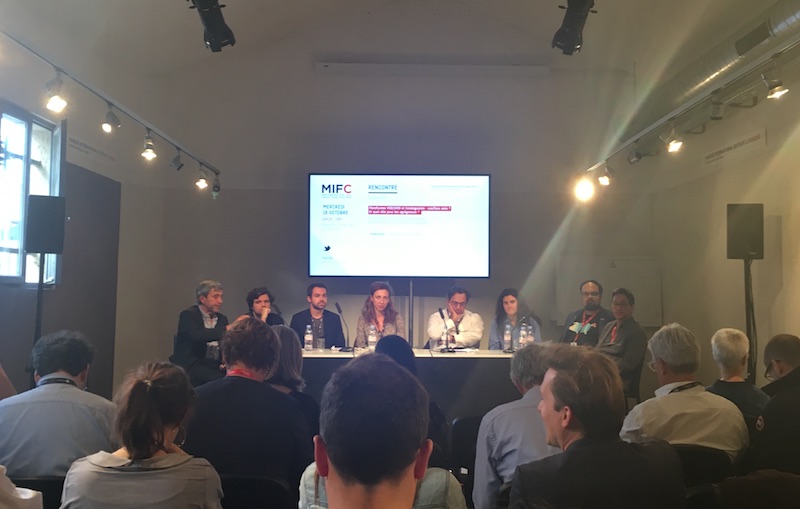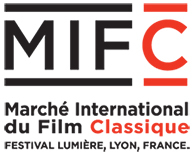SVoD / VoD roundtable: "You have to desacralize classic movies"
Wednesday came to an end with the round table, broadcast live, dedicated to the relationship between SVoD / VoD and catalogue managers and hosted by Sarah Drouhaud.

As pointed out by Jérôme Soulet during his keynote and as Sarah Drouhaud of Le Film français said: "The future of classical cinema will have to pass by the non-linear". But how is the relationship between catalogue managers and platforms? In general, all the panelists present, Quentin Carbonnel, director of acquisitions of Mubi, Jérôme Chung, co-founder of Under the Milky Way, Mathias Hautefort, president of Vitis, Charles Hembert, director of editions of UniversCiné, Marie-Louise Khondji, founder and general manager of Le Cinema Club, Jean Ollé-Laprune, editorial director of FilmoTV and Jean-Baptiste Viaud, general delegate of LaCinetek, agree that relations with rights-holders are rather positive. None of them has expressed real difficulties, and especially not Charles Hembert whose UniversCiné entity was born of an association of rights holders. Jean Ollé-Laprune, who was one of the pioneers of VoD with FilmoTV, however, stressed that it was still necessary to do a little pedagogy, the concept of "internet" being sometimes worrying for some. For his part, Jean-Baptiste Viaud explained that, in the case of La Cinetek, which brings together films by list defined by a chosen director, the "picking" syndrome was sometimes restrictive.
The main concerns of these platforms in connection with the repertory cinema? The availability of digital versions, the lack of French distribution (sometimes making the hunt for rights-holders difficult), the lack of subtitles or the excessive MG requested by the United States: "With the Americans, we do not start trading below six digits "says Mathias Hautefort. Another problem raised by the latter is sometimes also the lack of accessibility to the internet, and especially to broadband, for some potential users which hence the 2 in 1 offer from Video Futur to be both an access provider to internet and a content platform: "We are going where the big operators do not want to go".
But are the customers curious about the repertory cinema? The question is a little sensitive. Indeed, if Jean Ollé-Laprune notes a small amplitude between the most and least seen films and that Charles Hembert insists that each film on UniversCiné was seen at least once, it remains the most recent films that attract the potential spectators on these platforms. A statement shared by Jerome Chung. After defining what an aggregator was (a legal, technical, financial and editorial interface between rightholders and platforms), he explained that, based on his five years of experience in this sector, the demand for heritage films, in France and abroad, remains weak: "We do not find the same appetite for classic films on the VOD / SVOD than on the DVD a few years ago" he insists.
So what can be done to attract these potential audiences to restorations or rarer films? The methods are different "but we all seek to be creative," said Charles Hembert. Moreover, on UniversCiné, with a catalog of 5,200 films, priority is given to complementarity with other cinema activities. Thus, with the Blaq Out label, also belonging to the LMC group, cross-releases combining collector's box and online viewing are organized. The platform also works with the cinema actuality as, for example, when a director releases a new movie in theatres, it sees the opportunity for an online retrospective. A more or less similar process is proposed by Le Cinema Club of Marie-Louise Khondji. The site offers each week a single new work (film, short film ...) for free. The idea is both to be a promotional relay for an artist as well as a real editorial bias.
Curation is also an angle possible and it is the one chosen by La Cinetek with its lists of films chosen by cult filmmakers. Similarly for MUBI, which offers 30 films per month, chosen and editorialized by its own programmers: "we do not come to MUBI to find a film, but with a desire for cinema," explains Quentin Carbonnel. All the panelists agreed that, for heritage cinema, it was necessary to take the users by the hand and to do so it was also essential to be creative and not to be afraid to desacralize those movies that sometimes can be off-putting, especially for a younger audience.
In all the cases present this Wednesday afternoon, the question of the institutional aids was unanimous: they are necessary, the model being still hardly profitable, the platforms suffering from a slight lack of recognition. But the wind is turning ...



